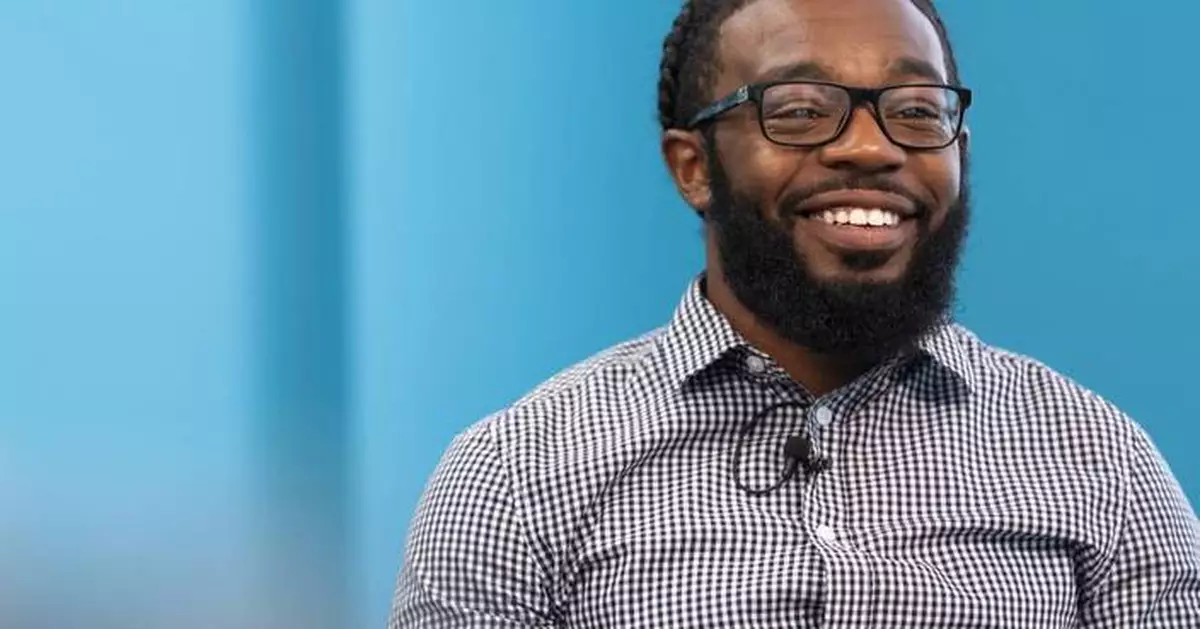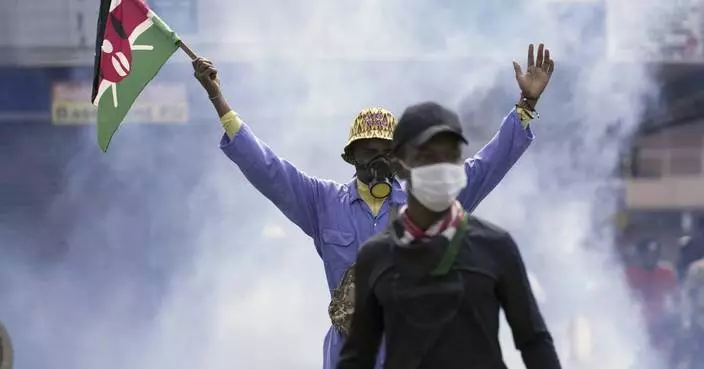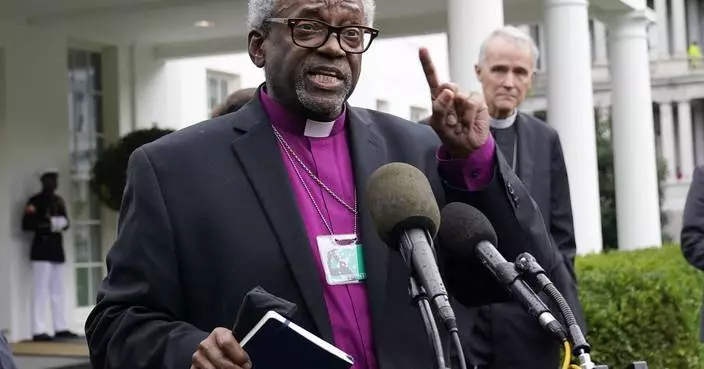BALTIMORE (AP) — For years, a few crumbs of cannabis played an outsized role in shaping Shiloh Jordan’s life.
With a stroke of a pen by Maryland Gov. Wes Moore, Jordan looks forward to that being in the past for him — as well as tens of thousands of other Marylanders who have been pardoned for misdemeanor marijuana convictions.
Click to Gallery
BALTIMORE (AP) — For years, a few crumbs of cannabis played an outsized role in shaping Shiloh Jordan’s life.
Shiloh Jordan, right, who was among the people receiving a pardon for a misdemeanor marijuana conviction years ago, greets Maryland Gov. Wes Moore at a news conference in Annapolis, Md., on Monday, June 17, 2024, when Moore announced more than 175,000 pardons. Maryland Attorney General Anthony Brown is center. (AP Photo/Brian Witte)
Shiloh Jordan, a Baltimore native whose cannabis conviction was pardoned by an executive order from Maryland Gov. Wes Moore on Monday, speaks to the Associated Press during an interview, Tuesday, June 18, 2024, in Baltimore. (AP Photo/Stephanie Scarbrough)
Shiloh Jordan, a Baltimore native whose cannabis conviction was pardoned by an executive order from Maryland Gov. Wes Moore on Monday, points to photos in his office at the Center for Urban Families in Baltimore where he works, Tuesday, June 18, 2024. (AP Photo/Stephanie Scarbrough)
Shiloh Jordan, a Baltimore native whose cannabis conviction was pardoned by an executive order from Maryland Gov. Wes Moore on Monday, speaks to the Associated Press during an interview, Tuesday, June 18, 2024, in Baltimore. (AP Photo/Stephanie Scarbrough)
Shiloh Jordan, a Baltimore native whose cannabis conviction was pardoned by an executive order from Maryland Gov. Wes Moore on Monday, speaks to the Associated Press during an interview, Tuesday, June 18, 2024, in Baltimore. (AP Photo/Stephanie Scarbrough)
Shiloh Jordan, a Baltimore native whose cannabis conviction was pardoned by an executive order from Maryland Gov. Wes Moore on Monday, speaks to the Associated Press during an interview, Tuesday, June 18, 2024, in Baltimore. (AP Photo/Stephanie Scarbrough)
Shiloh Jordan, a Baltimore native whose cannabis conviction was pardoned by an executive order from Maryland Gov. Wes Moore on Monday, speaks to the Associated Press during an interview, Tuesday, June 18, 2024, in Baltimore. (AP Photo/Stephanie Scarbrough)
Shiloh Jordan, a Baltimore native whose cannabis conviction was pardoned by an executive order from Maryland Gov. Wes Moore on Monday, walks through the Center for Urban Families in Baltimore where he works, Tuesday, June 18, 2024. (AP Photo/Stephanie Scarbrough)
Shiloh Jordan, a Baltimore native whose cannabis conviction was pardoned by an executive order from Maryland Gov. Wes Moore on Monday, speaks to the Associated Press during an interview, Tuesday, June 18, 2024, in Baltimore. (AP Photo/Stephanie Scarbrough)
“I just feel like this is a big opportunity for people, you know, to not let struggles get in their way,” Jordan, 32, said in an interview with The Associated Press on Tuesday, a day after he watched the governor sign an executive order for the sweeping pardon of more than 175,000 convictions.
Jordan was in his early 20s when he was pulled over in Howard County, Maryland, for not wearing a seatbelt on his way home from work as a custodian at a nursing home. The officer said she smelled marijuana, and using a piece of tape, she found cannabis crumbs on the floor of the vehicle, Jordan said.
“She was just like, ‘Yep, you’re going to jail,’” Jordan recalled of the incident from about a dozen years ago. “I’m like what? Are you serious?”
“But that was the law back then, so she took me to jail, locked me up,” Jordan said.
He said he didn’t think much of the minor charge — until his second day at a new job when he was let go because a background check had uncovered his misdemeanor conviction. It was disheartening, and it made him think about the myriad challenges facing young people growing up in poverty, all the things that so often stand in the way of them staying on the straight and narrow, Jordan said.
“I felt defeated,” he said. “I was just trying to, you know, do the right thing.”
He ended up participating in a job readiness program and later going back to school and playing football in college. He now works as an outreach coordinator at the Center for Urban Families in Baltimore, a nonprofit focused on helping families pull themselves out of poverty.
The governor’s actions this week come after President Joe Biden’s administration announced earlier this year that it will take a historic step toward easing federal restrictions on cannabis, reclassifying the drug.
Recreational cannabis was legalized in Maryland in 2023 after voters approved a constitutional amendment in 2022 with 67% of the vote. Maryland decriminalized possession of personal use amounts of cannabis on Jan. 1, 2023. Now, 24 states and the District of Columbia have legalized recreational marijuana.
“This is about changing how both government and society view those who have been walled off from opportunity because of broken and uneven policies,” Moore, a Democrat, said during Monday’s announcement.
Advocates praised the move, both for its symbolic significance and for its potential to help remove barriers to housing, employment and other opportunities.
“It was a gargantuan step forward in recognizing the harms of the war on drugs, the racist war on drugs,” said Somil Trivedi, chief legal and advocacy director for Maryland Legal Aid. “It’s also, meaningfully, a recognition of that past and a way to move forward.”
The governor’s pardon absolves an individual from guilt of a criminal offense. But it is not an expungement that destroys the record of the offense. The Maryland Judiciary will instead make a note that the offense has been pardoned, leaving it to remain on the record. People who have been pardoned can seek expungement in court.
Jordan said he’s unfamiliar with the expungement process but plans to look into it.
On Monday, hours after Moore signed an executive order granting the pardons, the clerk of court for Baltimore said the office was committed to providing all necessary assistance for expunging the charges from people’s records.
The pardons come following statewide legislation passed in 2023 that called for simple marijuana possession convictions to be expunged from people’s records. That law goes into effect next month, but some people who received pardons may still want to apply to have their records expunged, said Meaghan McDermott, chief attorney for community lawyering at Maryland Legal Aid.
She said the combined effect of the two initiatives is significant.
In a statement, Xavier Conaway, the clerk of the Circuit Court for Baltimore City, said the governor’s action “acknowledges the importance of the fair administration of justice in removing educational, housing, and employment barriers that have long disproportionately affected the lives of many Baltimoreans.”
Maryland’s largest city had the state’s highest number of pardons — 39,865, or about 23% of the total number.
“Our office is committed and ready to provide all necessary assistance to ensure that pardoned individuals in Baltimore City can navigate the expungement process smoothly and efficiently,” Conaway said.
This story corrects the estimated number of pardons. It is more than 175,000, not 197,000.
Witte reported from Annapolis, Md.

Shiloh Jordan, a Baltimore native whose cannabis conviction was pardoned by an executive order from Maryland Gov. Wes Moore on Monday, poses for a portrait in his office at the Center for Urban Families in Baltimore, Tuesday, June 18, 2024. (AP Photo/Stephanie Scarbrough)
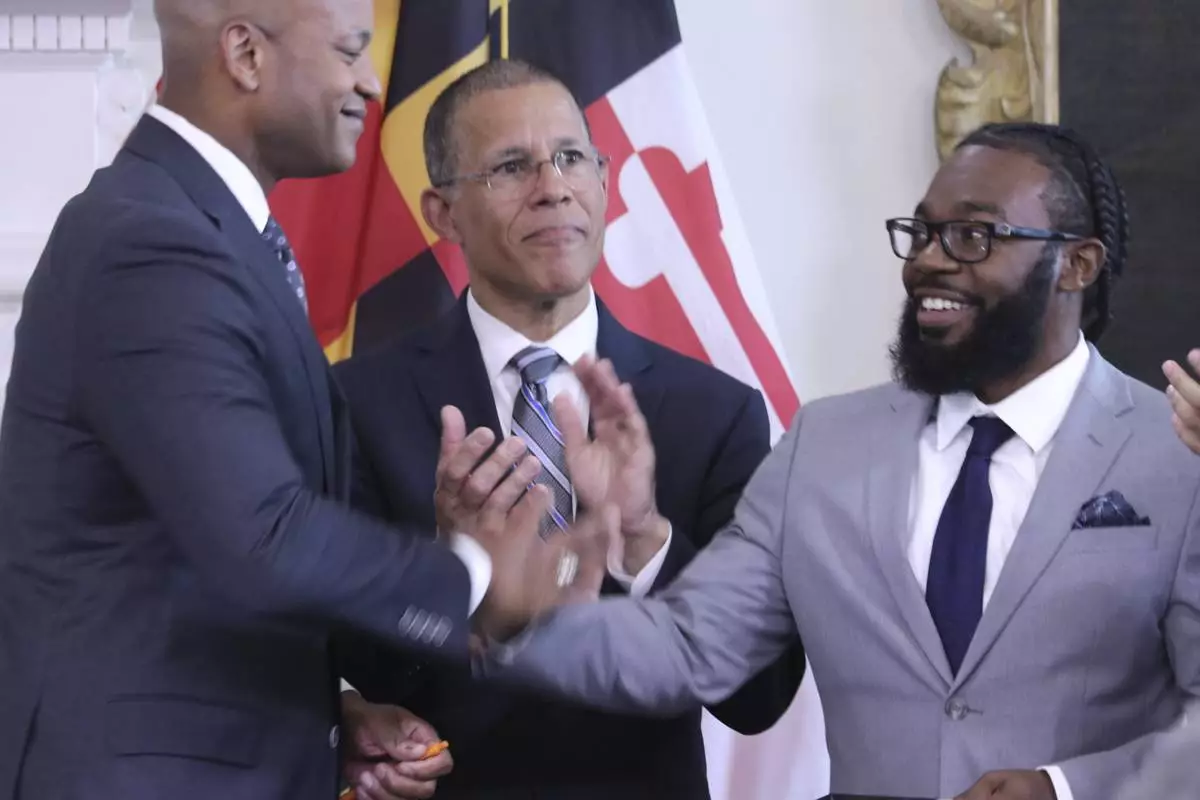
Shiloh Jordan, right, who was among the people receiving a pardon for a misdemeanor marijuana conviction years ago, greets Maryland Gov. Wes Moore at a news conference in Annapolis, Md., on Monday, June 17, 2024, when Moore announced more than 175,000 pardons. Maryland Attorney General Anthony Brown is center. (AP Photo/Brian Witte)
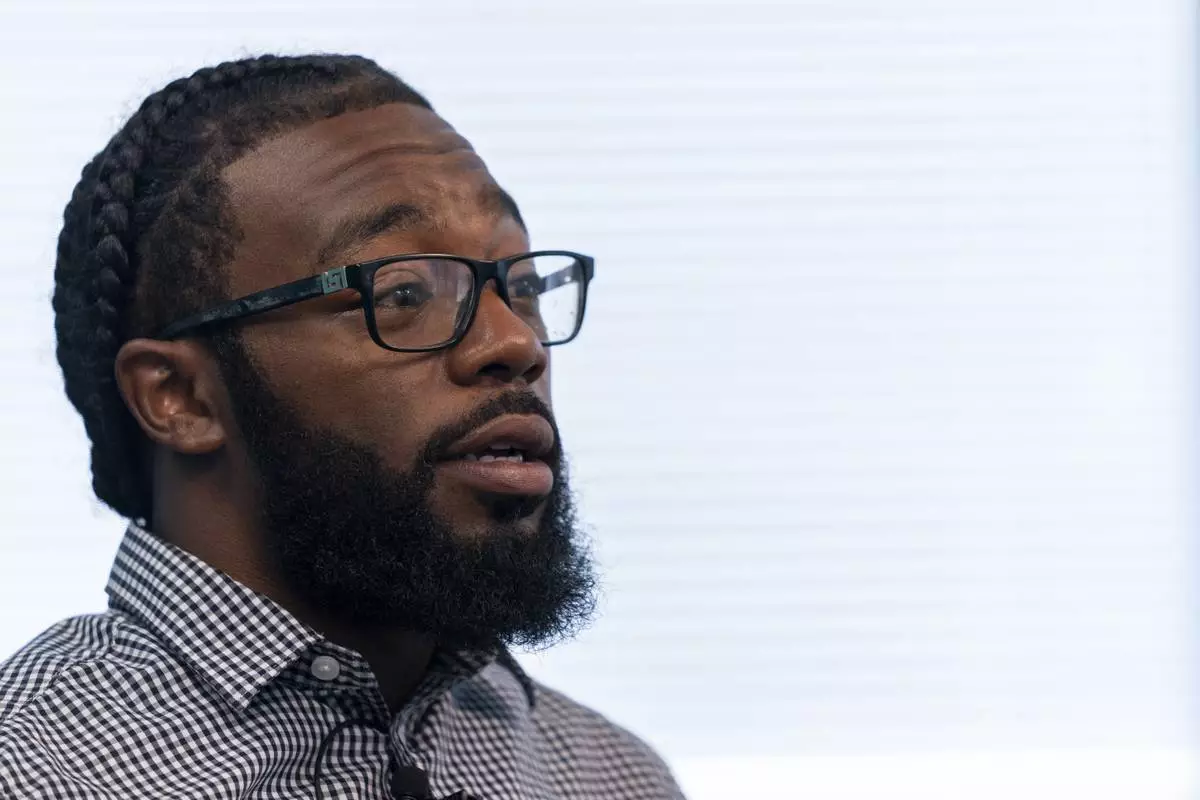
Shiloh Jordan, a Baltimore native whose cannabis conviction was pardoned by an executive order from Maryland Gov. Wes Moore on Monday, speaks to the Associated Press during an interview, Tuesday, June 18, 2024, in Baltimore. (AP Photo/Stephanie Scarbrough)
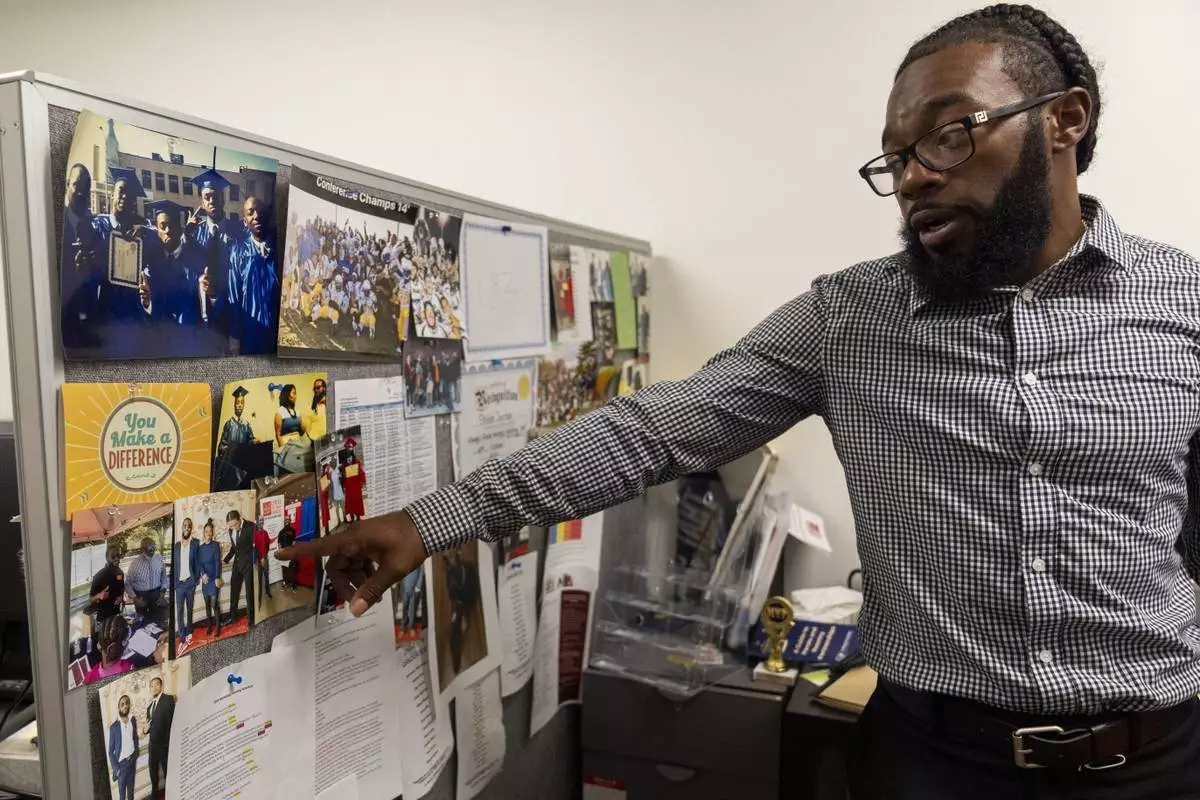
Shiloh Jordan, a Baltimore native whose cannabis conviction was pardoned by an executive order from Maryland Gov. Wes Moore on Monday, points to photos in his office at the Center for Urban Families in Baltimore where he works, Tuesday, June 18, 2024. (AP Photo/Stephanie Scarbrough)
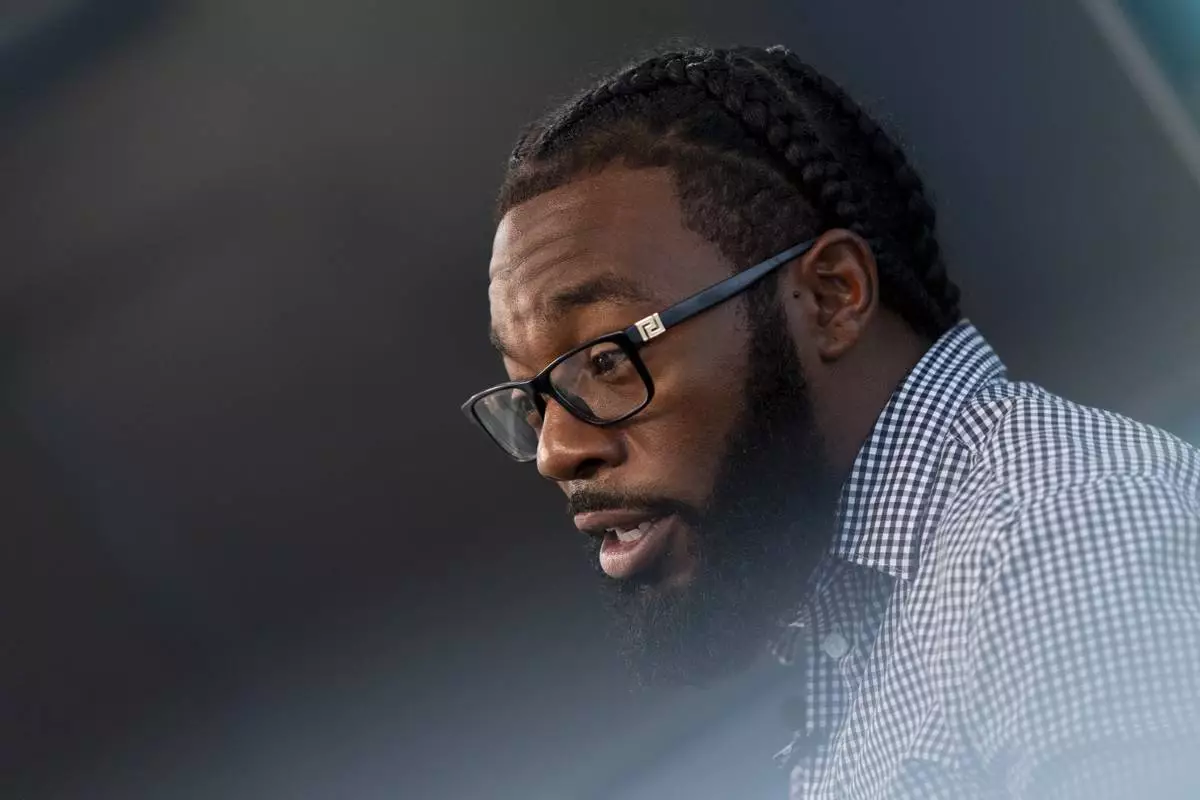
Shiloh Jordan, a Baltimore native whose cannabis conviction was pardoned by an executive order from Maryland Gov. Wes Moore on Monday, speaks to the Associated Press during an interview, Tuesday, June 18, 2024, in Baltimore. (AP Photo/Stephanie Scarbrough)
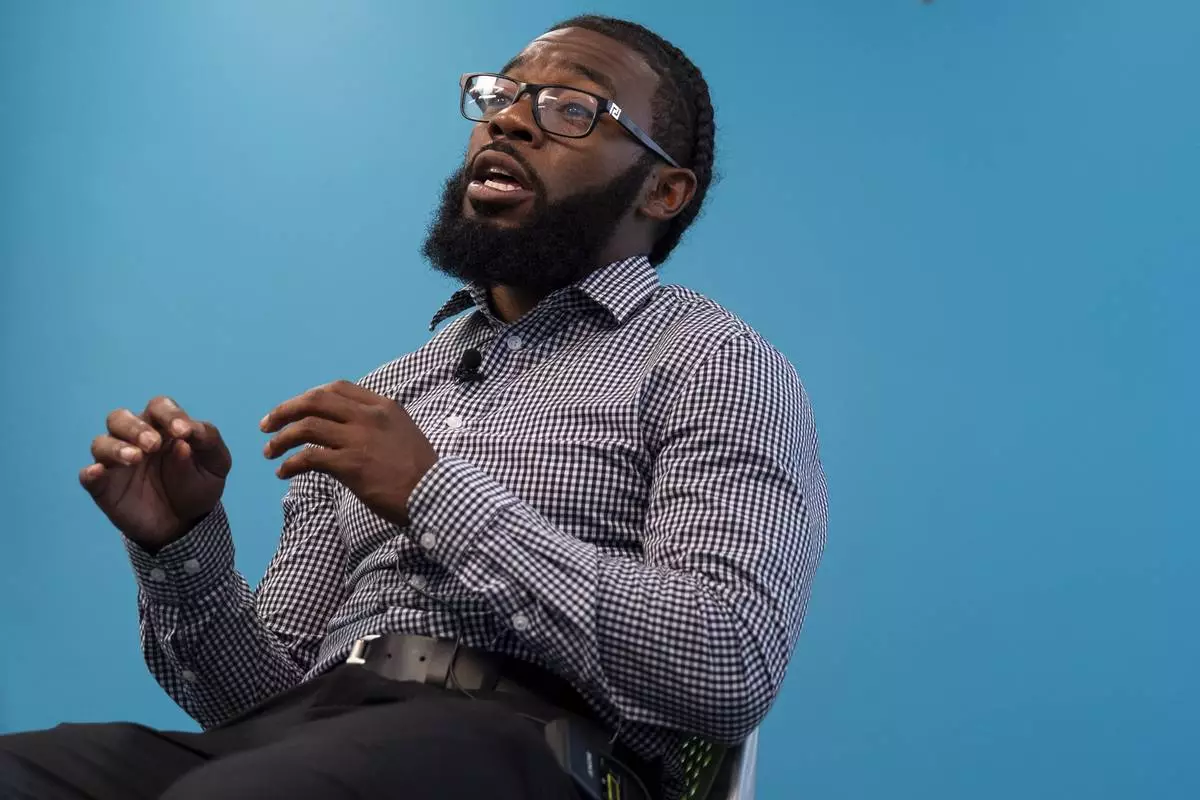
Shiloh Jordan, a Baltimore native whose cannabis conviction was pardoned by an executive order from Maryland Gov. Wes Moore on Monday, speaks to the Associated Press during an interview, Tuesday, June 18, 2024, in Baltimore. (AP Photo/Stephanie Scarbrough)

Shiloh Jordan, a Baltimore native whose cannabis conviction was pardoned by an executive order from Maryland Gov. Wes Moore on Monday, speaks to the Associated Press during an interview, Tuesday, June 18, 2024, in Baltimore. (AP Photo/Stephanie Scarbrough)
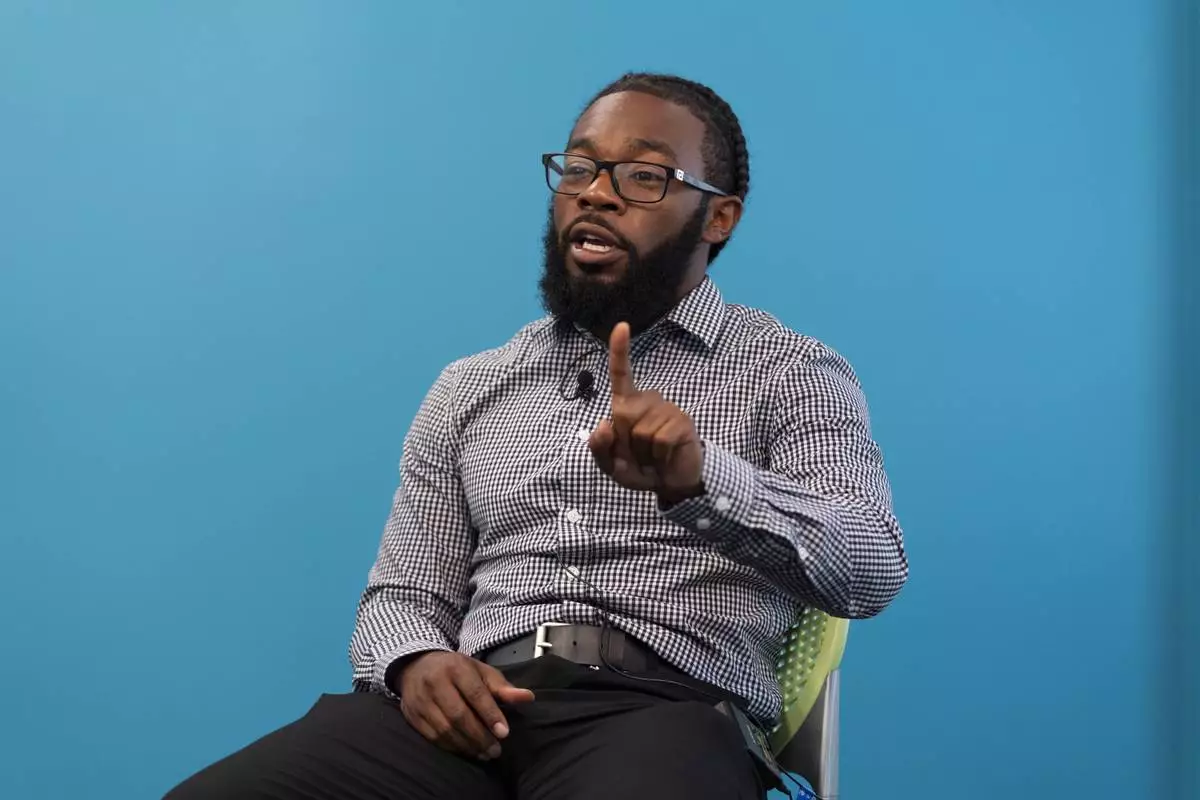
Shiloh Jordan, a Baltimore native whose cannabis conviction was pardoned by an executive order from Maryland Gov. Wes Moore on Monday, speaks to the Associated Press during an interview, Tuesday, June 18, 2024, in Baltimore. (AP Photo/Stephanie Scarbrough)
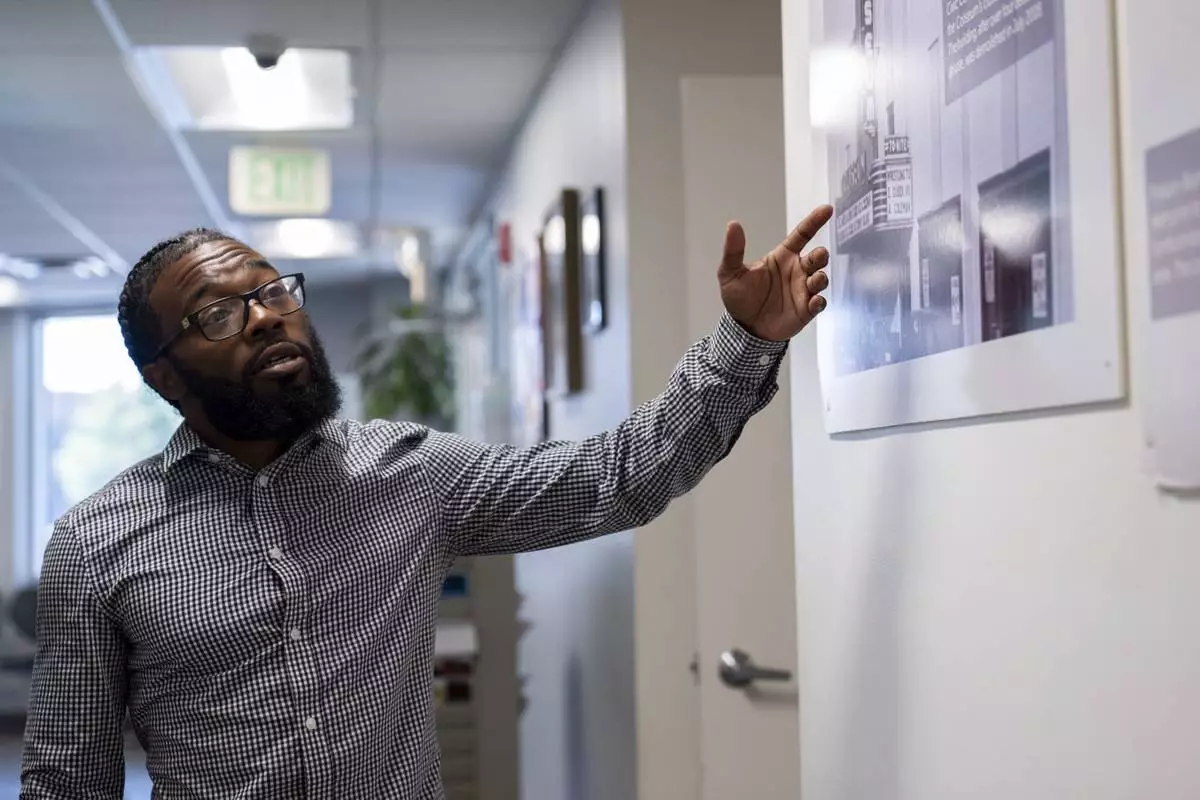
Shiloh Jordan, a Baltimore native whose cannabis conviction was pardoned by an executive order from Maryland Gov. Wes Moore on Monday, walks through the Center for Urban Families in Baltimore where he works, Tuesday, June 18, 2024. (AP Photo/Stephanie Scarbrough)
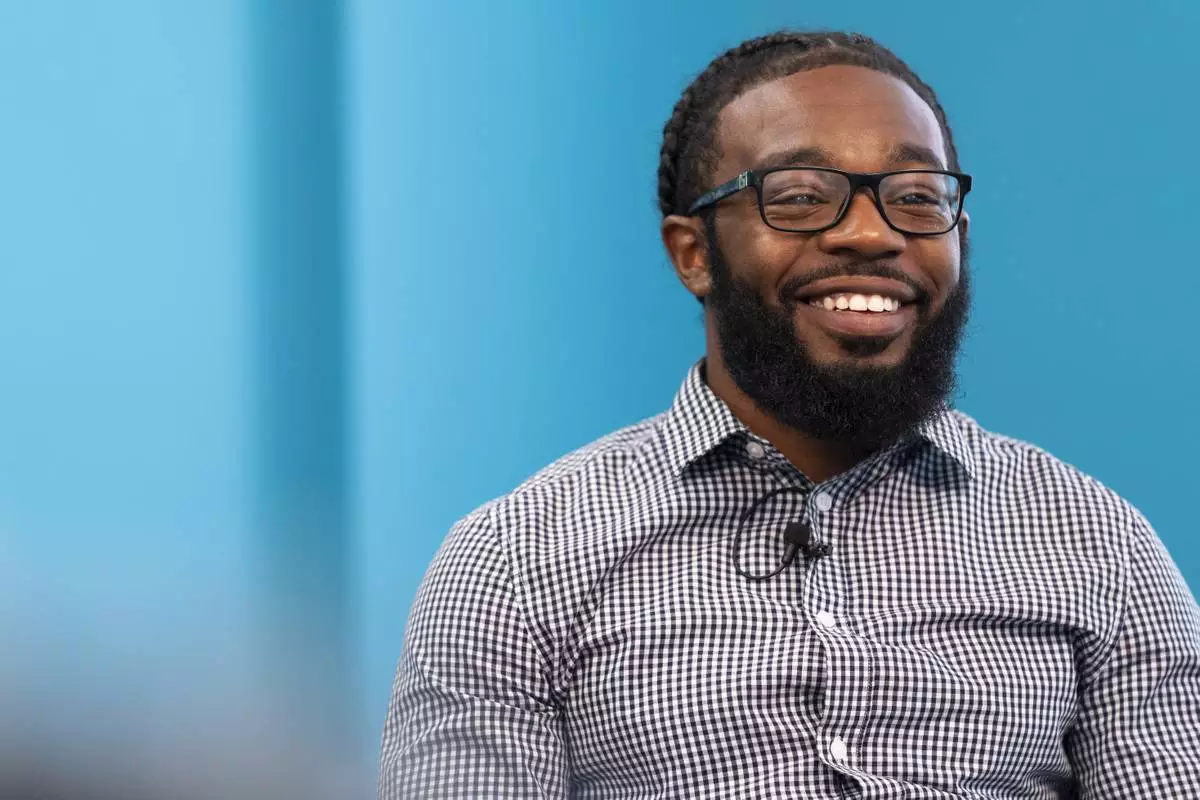
Shiloh Jordan, a Baltimore native whose cannabis conviction was pardoned by an executive order from Maryland Gov. Wes Moore on Monday, speaks to the Associated Press during an interview, Tuesday, June 18, 2024, in Baltimore. (AP Photo/Stephanie Scarbrough)
PARIS (AP) — France’s government on Wednesday ordered the dissolution of multiple extreme right and radical Muslim groups, four days before the first round of high-stakes legislative elections that may see a surge in support for political extremes.
Snap national elections called by pro-business moderate President Emmanuel Macron have plunged the country into a hasty and disorderly electoral race, in which hate speech is becoming a growing concern.
Interior Minister Gerald Darmanin announced Wednesday that the government ordered the shutdown of several groups peddling extremist hatred. A series of decrees announcing the shutdown outlined investigations into the groups and said they posed risks of violence.
The groups affected include GUD, known for violence and antisemitism. Its members have supported far-right political leader Marine Le Pen in the past.
Le Pen's National Rally party is leading all polls ahead of the two-round elections, June 30 and July 7, while Macron's centrist alliance is lagging far behind. However, the outcome remains highly uncertain due to the complex, two-stage voting system and potential political alliances.
This is not the first time the French government has moved to dissolve groups it believes infringe on security and human rights, but the pre-election timing of Wednesday’s announcement appeared to send a clear message about extremism.
Another targeted group, called Les Remparts, is accused of inciting hate, discrimination and violence toward foreigners and non-white people, according to Interior Ministry decrees reviewed by The Associated Press.
Some members, a decree said, wear a jacket bearing the inscription “White Division'' and the group has offered self-defense trainings. The ministry cites a 2023 attack in which dozens of hooded far-right militants, armed with iron bars, attacked a civil society group at a conference about Palestinians. Some of the attackers had ties with Les Remparts, the decree said.
Another decree targeted a group called Jonas Paris, which it said claims to support France's Muslim community but instead promotes violence, hate and discrimination toward non-Muslims, women and LGBTQ+ people.
Antisemitic and anti-Muslim discourse has also surfaced in the campaign.
Activist group SOS Racisme announced Wednesday it filed a lawsuit seeking to stop the spread of a widely shared video that mocks people of African origin and tells them to ‘’go home.’’ The lawsuit is seeking charges of provocation of racial hatred against the video’s creators.
Noting similar videos that have appeared in Germany, the group said, ‘’these expressions of unbridled racism reflect a climate of the freeing-up of racist speech, fed by the worrying scores of the far right'' in recent elections around Europe.
Facing the prospect that France could elect its first far-right government since the Nazi occupation during World War II, other parties have been scrambling to form alliances and field candidates. The elections were called by Macron earlier this month after his party suffered a crushing defeat in the European Parliament election.
In a TV debate Tuesday night, young and fast-rising National Rally president Jordan Bardella renewed his proposal to abolish free health care for foreigners and toughen regulations around acquiring French nationality.
His proposal to prevent dual citizens from accessing certain “strategic” state jobs in particular attracted the ire of Prime Minister Gabriel Attal, who said it revealed the true objectives of a party that has long been tied to xenophobia and racism.
“The message you are sending is that when we are dual citizens, we are half-citizens, we are not real French people,” Attal said.
Attal suggested the real targets of this measure are not dual citizens with high-level positions, when he said Bardella's party had a Franco-Russian representative in the European Parliament.
Bardella has softened many of the party's hard-line positions, and was put on the spot during the debate over another key issue, the age of retirement. Macron's raised it last year from 62 to 64, prompting months of protests that weakened his government.
The National Rally backs the idea of setting back the retirement age to 62, but Bardella said 42 years of work would be needed for entitlement to a full pension, de facto raising the retirement age for those who started working later in their 20s.
Eric Bompard, of the France Unbowed party, part of a new left-wing coalition, also came after Bardella’s economic program and his proposal to lift taxes for people under 30.
Bompard said the National Rally’s program would contribute to making the rich richer, at the expense of the poorest 30% share of the population, while Attal accused the 28-year-old Bardella of personally benefiting from the measure.
“Why would a 31-year-old laborer pay taxes, while a 29-year-old consultant or trader would stop paying?” Attal asked.
Associated Press writer Sylvie Corbet in Paris contributed to this report.
Follow the AP’s coverage of global elections at: https://apnews.com/hub/global-elections/
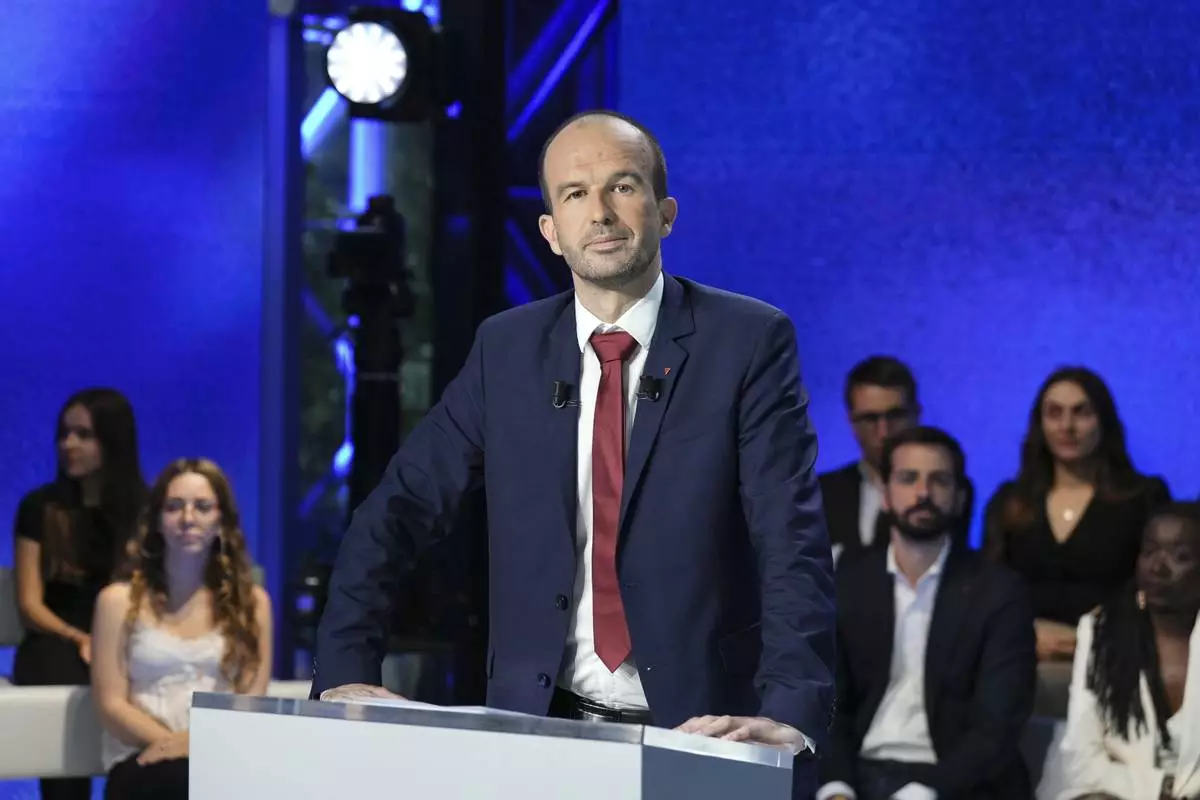
Far-left party La France Insoumise (France Unbowed) member Manuel Bompard poses prior to a debate broadcasted on French TV channel TF1, in Boulogne-Billancourt, outside Paris, Tuesday, June 25, 2024. The two-round parliamentary election will take place on June 30 and July 7. (Dimitar Dilkoff, Pool via AP)

French Prime Minister Gabriel Attal poses prior to a debate broadcasted on French TV channel TF1, in Boulogne-Billancourt, outside Paris, Tuesday, June 25, 2024. The two-round parliamentary election will take place on June 30 and July 7. (Dimitar Dilkoff, Pool via AP)

French far-right Rassemblement National (National Rally) party President Jordan Bardella poses prior to a debate broadcasted on French TV channel TF1, in Boulogne-Billancourt, outside Paris, Tuesday, June 25, 2024. The two-round parliamentary election will take place on June 30 and July 7. (Dimitar Dilkoff, Pool via AP)

From the left, French far-right Rassemblement National (National Rally) party President Jordan Bardella, French Prime Minister Gabriel Attal and far-left party La France Insoumise (France Unbowed) member Manuel Bompard pose prior to a debate broadcasted on French TV channel TF1, in Boulogne-Billancourt, outside Paris, Tuesday, June 25, 2024. The two-round parliamentary election will take place on June 30 and July 7. (Dimitar Dilkoff, Pool via AP)












